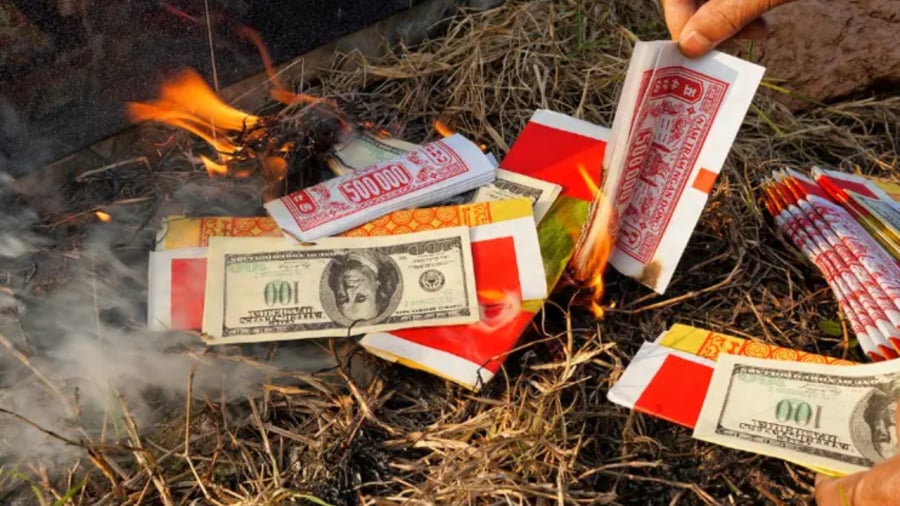The tradition of burning votive offerings is deeply rooted in the consciousness of many Vietnamese. This act expresses reverence and remembrance of ancestors and embodies hopes for a peaceful life filled with luck and prosperity.
To properly conduct this ritual, known as burning votive offerings, one should pay attention to the following points:
Choose the Right Timing
Traditionally, burning votive offerings takes place after completing rituals such as offering meals, objects, and incense burning. The host will wait for the incense to burn out, ask for permission to conclude the ceremony, and then proceed to burn the votive offerings.
It is important not to burn votive offerings too early or too late as it may impact the sacredness of the ritual. The host can choose to perform this ritual either in the morning or in the afternoon.
During festive occasions like the Lunar New Year, votive offerings can be kept on the altar for a few days, and then burned on an auspicious day and time, marking the end of the festive period.

Prepare a Suitable Space
When preparing to burn votive offerings, the host should ensure a clean, spacious, and dignified environment. Prior to the ritual, the host can tidy up the altar, replace incense and candles, and prepare fresh offerings of water.
Burning votive offerings indoors is considered taboo and may also pose a fire hazard. Therefore, the host should burn the offerings outdoors or in a well-ventilated area to allow for better air circulation. Additionally, it is important to stay clear of flammable objects.
Performing the Ritual
After preparing the offerings and placing them on the altar, the host will light incense to invite ancestors and deities to witness the ceremony. Once the incense has burned out, the host can proceed with burning the votive offerings.
During incense burning and votive offering rituals, it is important to maintain a quiet and solemn atmosphere.
While burning the offerings, the host can recite words of reverence to their ancestors or offer prayers. If the offerings include alcohol, a few drops can be sprinkled onto the burned votive offerings. It is believed that this act enhances the sacredness of the ritual and ensures that the ancestors receive the offerings sent by their descendants.
Do Not Remove Offerings Before Burning Votive Offerings
According to folk beliefs, deities and ancestors always preside over the altar. Therefore, it is imperative not to remove the offerings before burning votive offerings. Once the ceremony is concluded, it is advisable to burn the votive offerings promptly and not leave them on the altar for too long.
It is important to note that burning excessive amounts of votive offerings can lead to waste and environmental pollution. Thus, it is recommended to use a moderate amount of offerings to express reverence and respect for one’s ancestors. Nowadays, many families reduce the amount of offerings and votive burning to protect the environment. The decision ultimately depends on individual beliefs and preferences.
Information provided is for reference and contemplation only.



































